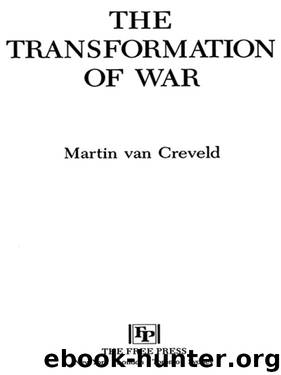Transformation of War by Van Creveld Martin

Author:Van Creveld, Martin [Van Creveld, Martin]
Language: eng
Format: epub
Tags: SOC035000
Publisher: Free Press
Published: 2009-11-23T22:00:00+00:00
CHAPTER V
What War Is Fought For
Political War
We have seen that the two cardinal elements of the Clausewitzian universe are, first, that war is necessarily waged by the state, and second that it necessarily tends towards the use of unrestrained force. It is now time to examine a third cardinal postulate: namely, that war is a means to an end or, to use the master’s own highly pregnant formulation, “the continuation of politics with an admixture of other means.” No other dictum of Clausewitz’s has acquired nearly as much fame, and none is quoted more frequently even by those—some would say, particularly by those—who have never taken the trouble to read his work. So descriptive of much modern armed conflict is the idea that war is the servant of policy, that many people today cannot even imagine an alternative to it. Nevertheless, and if only because its very ubiquity tends to conceal its meaning, it deserves serious analysis.
The end which war is supposed to serve is Politik, a German word that may mean either “politics” or “policy.” Once again, Clausewitz’s thought must be interpreted against the contemporary intellectual background. From Montesquieu to Kant, the majority of enlightenment writers had regarded war as an aberration. It represented an interruption of political intercourse, in fact an interruption of civilized life in general; war was the point where human reason came to an end or, at any rate, where it had not yet triumphed. Nor was this view without effect on the actual conduct of war. Most eighteenth-century commanders were probably influenced by it to some extent, with the result that they tried to make war in a cautious, “civilized” manner while minimizing the damage to the environment. Therefore, when Clausewitz insisted that war was merely one of the forms that political intercourse took, he was making a point that was both new and important. Vom Kriege presents war as a language of politics, so to speak, one whose “grammar”—to use its author’s own formulation—consisted of shells and bullets rather than words and gestures.
One logical outcome of such a view was that the high conduct of war should be made subject, if not to politicians, then at any rate to political considerations. A second was that war should be fought solely for political reasons; a third, that politics should constitute the most important criterion by which the outcome of war is judged and the next one prepared for. None of these ideas is self-evident. During the nine-teenth century they encountered much resistance, particularly on the part of officers who refused to recognize that there might be something higher than war to which, in consequence, they should subordinate themselves. Yet all these ideas have entered modern strategic thought in developed countries, even to the point that they are usually taken for granted.
Whatever the exact meaning of the term “politics,” it is not the same as “any kind of relationship involving any kind of government in any kind of society.” A more correct interpretation would be
Download
This site does not store any files on its server. We only index and link to content provided by other sites. Please contact the content providers to delete copyright contents if any and email us, we'll remove relevant links or contents immediately.
| Anthropology | Archaeology |
| Philosophy | Politics & Government |
| Social Sciences | Sociology |
| Women's Studies |
The Secret History by Donna Tartt(19086)
The Social Justice Warrior Handbook by Lisa De Pasquale(12190)
Thirteen Reasons Why by Jay Asher(8909)
This Is How You Lose Her by Junot Diaz(6886)
Weapons of Math Destruction by Cathy O'Neil(6279)
Zero to One by Peter Thiel(5801)
Beartown by Fredrik Backman(5754)
The Myth of the Strong Leader by Archie Brown(5507)
The Fire Next Time by James Baldwin(5442)
How Democracies Die by Steven Levitsky & Daniel Ziblatt(5218)
Promise Me, Dad by Joe Biden(5153)
Stone's Rules by Roger Stone(5087)
A Higher Loyalty: Truth, Lies, and Leadership by James Comey(4961)
100 Deadly Skills by Clint Emerson(4925)
Rise and Kill First by Ronen Bergman(4788)
Secrecy World by Jake Bernstein(4753)
The David Icke Guide to the Global Conspiracy (and how to end it) by David Icke(4717)
The Farm by Tom Rob Smith(4507)
The Doomsday Machine by Daniel Ellsberg(4490)
